122 items have been found that match your search request.
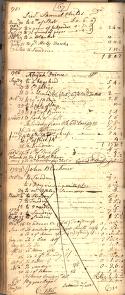 |
Account Book of Elijah Williams, Ledger B, Vol. 3
1751-1757
L00.084
Storekeeper (Elijah Williams) accounts with Abijah Prince. This is a page from the account book of Deerfield, Massachusetts, storekeeper Elijah Williams (1712-1771) that includes purchases and payments from the free black man, Abijah Prince. |
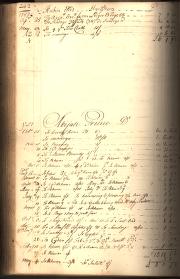 |
Account Book of Elijah Williams, Ledger C, Vol. 4
1755-1759
L00.085
Storekeeper (Elijah Williams) accounts with Abijah Prince. This is a page from the account book of Elijah Williams (1712-1771) describing the purchases and payments of Abijah Prince (b.c.1715), a free black in Deerfield, Massachusetts, in the years 1756 and 1757. |
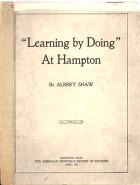 |
"Learning By Doing At Hampton"
1900
L01.005
Boarding schools like the Hampton Institute sought not merely to educate but also to indoctrinate young Native and African American students in the values and customs of white society. |
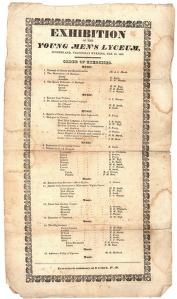 |
"Exhibition of the Young Men's Lyceum"
Feb 25, 1835
L01.107
The young men of the town of Sunderland formed a lyceum, or educational society, in 1835 and began to offer lectures open to the public. This exhibition gives a good cross-slice of high-minded popular culture of the 1830s, including a debate about slavery. |
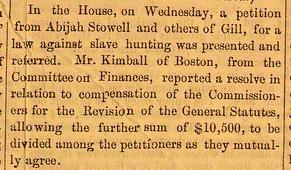 |
"Legislature- slave hunting petition"
Feb 13, 1860
L02.106
Although the Fugitive Slave Act of 1850 required states to assist federal marshals in retrieving slaves, many states such as Massachusetts resented having that role. Moves in the state legislature sought to end the state's cooperation with federal authorities in this matter. |
 |
"Union and Liberty"
Feb 13, 1860
L02.107
With the Civil War looming, many communities in the north were split. Some argued, like this article, that the South should be allowed to just go rather than be forced to stay in the Union. |
 |
Slave gives talk in Northfield
Feb 13, 1860
L02.108
Personal testimony by slaves was a central part of the antislavery movement in the north during the 1840s through 1860s. |
 |
"News Items"- Mass. Petitions to abolish slave-hunting
Mar 5, 1860
L02.109
The Fugitive Slave Act required that state authorities assist federal marshals to retrieve escaped slaves. In Massachusetts, resentment at these requirements led many to demand the state ignore federal summons. |
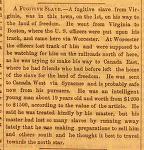 |
"Fugitive Slave"
Apr 13, 1860
L02.110
Many fugitive slaves passed through western Massachusetts communities on their way north to freedom. Because of the Fugitive Slave Act, they were no longer safe in the United States. A network of sympathizers formed the "Underground Railroad." |
 |
"Sacrifice of Life"
Apr 27, 1860
L02.111
Although the U.S. had forbidden the entry of slaves from Africa in 1808, a number of U.S. slavers continued to traffic in African slaves, landing them instead in Cuba. Antislavery activists from the 1860s publicized their names and profits in an effort to shame them. |











